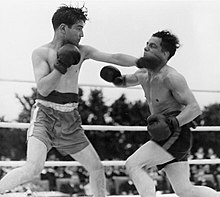Round (boxing)

Two Royal Navy men boxing for charity. The modern sport was codified in England.
|
|
| Also known as | Western Boxing, Pugilism See note. |
|---|---|
| Focus | Punching, striking |
| Country of origin | Prehistoric |
| Olympic sport | 688 BC (Ancient Greece) 1904 (modern) |
Boxing is a combat sport in which two people, usually wearing protective gloves, throw punches at each other for a predetermined set of time in a boxing ring.
Amateur boxing is both an Olympic and Commonwealth Games sport and is a common fixture in most international games—it also has its own World Championships. Boxing is supervised by a referee over a series of one- to three-minute intervals called rounds. The result is decided when an opponent is deemed incapable to continue by a referee, is disqualified for breaking a rule, resigns by throwing in a towel, or is pronounced the winner or loser based on the judges' scorecards at the end of the contest. In the event that both fighters gain equal scores from the judges, the fight is considered a draw (professional boxing). In Olympic boxing, due to the fact that a winner must be declared, in the case of a draw - the judges use technical criteria to choose the most deserving winner of the bout.
While humans have fought in hand-to-hand combat since before the dawn of history, boxing as an organized sport may have its origin in the ancient Greeks as an Olympic game in BC 688. Boxing evolved from 16th- and 18th-century prizefights, largely in Great Britain, to the forerunner of modern boxing in the mid-19th century with the 1867 introduction of the Marquess of Queensberry Rules.
The earliest known depiction of boxing comes from a Sumerian relief in Iraq from the 3rd millennium BCE Later depictions from the 2nd millennium BC are found in reliefs from the Mesopotamian nations of Assyria and Babylonia, and in Hittite art from Asia Minor. The earliest evidence for fist fighting with any kind of gloves can be found on Minoan Crete (c.1650–1400 BCE), and on Sardinia, if we consider the boxing statues of Prama mountains (c. 2000–1000 BC).
...
Wikipedia
